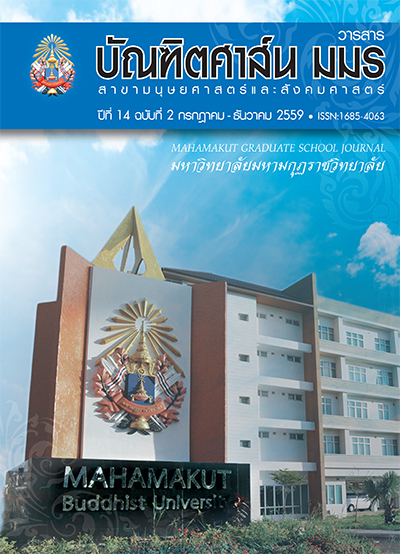การศึกษาจริยธรรมของเทวดาประจําธรรมชาติ ตามทัศนะพระพุทธศาสนาเถรวาท
คำสำคัญ:
คัมภีร์พระพุทธศาสนาธรรมชาติ, จริยธรรมคุณค่าต่อการพัฒนาชีวิตบทคัดย่อ
การวิจัยนี้มีวัตถุประสงค์ของการวิจัย 3 ประการ คือ (1) ศึกษาเทวดาที่ปรากฏในคัมภีร์พระพุทธ ศาสนา (2) เทวดาประจำธรรมชาติและจริยธรรม (3) ศึกษาจริยธรรมของเทวดาที่มีคุณค่าต่อการพัฒนา ชีวิตในทางพระพุทธศาสนาผลการศึกษาพบว่า
(1) ศึกษาเทวดาที่ปรากฏในคัมภีร์พระพุทธ ศาสนา หมู่เทพชาวสวรรค์เป็นคำรวมเรียก ชาว สวรรค์ทั้งเพศชายและเพศหญิง มีปรากฎ3 ประเภท คือ (1) สมมติเทพ (2) อุบัติเทพ (3) วิสุทธิเทพ มี สถานะความมีอยู่ต่อธรรมชาติและพระพุทธศาสนา ที่ประจักษ์อยู่แล้ว แต่เทวดาชนิดหนึ่งที่มองด้วยตา เนื้อของมนุษย์ไม่เห็นคือ อุบัติเทพ ซึ่งมีบทบาทต่อ ธรรมชาติและพระพุทธศาสนา เทวดามีอายุขัยใน สวรรค์โดยเฉลี่ย 1 วันเท่ากับ 800 ปี ในโลกมนุษย์
(2) เทวดาประจำธรรมชาติและจริยธรรมเทวดา ที่สถิตในธรรมชาติและมีบทบาทต่ธรรมชาตินั้นเป็น เทวดาในสวรรค์ชั้นจาตุมหาราชซึ่งเทวดาที่ศึกษามี ดังนี้ เทวดาแห่งป่า เรียกว่ารุกขเทวดา เทวดาแห่ง นภากาศ เรียกว่าวลาหกเทวดา เทวดาแห่งนํ้า เรียก ว่าพระแม่คงคา เทวดาแห่งฝน มีชื่อว่าพญาแถน แสดงการขอฝนด้วยบั้งไฟจุดขึ้นไปแล้วขอฝนมีชื่อ ทางพระพุทธศาสนาว่าพระพิรุณเทวดา เทวดาแห่ง ข้าว เรียกว่าแม่พระโพสพ
(3) ศึกษาจริยธรรมของเทวดาที่มีคุณค่าต่อ การพัฒนาชีวิตในทางพระพุทธศาสนา เทพหรือ เทวดามีสถานะที่มีอยู่เป็นจริง จะดำรงอยู่ด้วยการ ปฏิบัติในจริยธรรมซึ่งจริยธรรมสำหรับเทพคือ บุญ กิริยาวัตถุ 10 กุศลกรรมบถ 10 สัมปทา 5เทวธรรม2 วัตรบท 7 มีคุณค่าต่อการพัฒนามนุษย์ การทำบุญ ด้วยการให้ปันสิ่งชองทำบุญด้วยการรักษาศีลหรือ ประพฤติดีมีระเบียบวินัยและการทำบุญด้วยการ เจริญภาวนาคือฝึกอบรมจิตใจ
เอกสารอ้างอิง
พระธรรมปิฏก(ป.อ. ปยุตฺโต). (2546). พุทธธรรม. พิมพ์ครั้งที่ 11, กรุงเทพมหานคร : โรงพิมพ์มหาวิทยาลัยจุฬาลง กรณราชวิทยาลัย.
พระครูวินัยธรสุเทพอกิญจโณทับทิมเทศ. (2539).“การศึกษาเชิงวิเคราะห์เรื่องเทวดาในพระพุทธศาสนาเถรวาท”. วิทยานิพนธ์พุทธศาสตร์มหาบัณฑิต, บัณฑิตวิทยาลัย : มหาวิทยาลัยมหาจุฬาลงกรณราชวิทยาลัย.
พระครูสิริรัตนานุวัตร,รศ.ดร. (2555).(2556).“เทพสถิตในธรรมชาติทางพระพุทธศาสนา”,รายงานการวิจัย,สถาบันวิจัย พุทธศาสตร์.“คุณค่าทางจริยธรรมของเทพที่มีต่อการพัฒนาชีวิตในสังคมไทย”รายงานการวิจัย.สถาบันวิจัยพุทธศาสตร์ “คุณค่าทางจริยธรรมในประเพณีสงกรานต์”,รายงานการวิจัย,สถาบันวิจัยพุทธศาสตร์: มหาวิทยาลัยมหาจุฬาลงกรณราช วิทยาลัย.
พระมหาสมศักดิ์ สุวณฺณรตโน สุวรรณรัตน์. (2542).“ความเชื่อเรื่องเทวดาในพระพุทธศาสนาฝ่ายเถรวาท”.วิทยานิพนธ์ พุทธศาสตรมหาบัณฑิต,บัณฑิตวิทยาลัย : มหาวิทยาลัยมหามกุฏราชวิทยาลัย.
พระมหาพิสิฐ วิสิฏฐปญฺโญ สืบนิสัย. (2551).“การศึกษาวิเคราะห์หลักธรรมที่ปรากฏในเทวตาสังยุต”.วิทยานิพนธ์พุทธ ศาสตรมหาบัณฑิต, บัณฑิตวิทยาลัย : มหาวิทยาลัยมหาจุฬาลงกรณราชวิทยาลัย.
ดาวน์โหลด
เผยแพร่แล้ว
รูปแบบการอ้างอิง
ฉบับ
ประเภทบทความ
สัญญาอนุญาต
บทความวิชาการและบทความวิจัยในวารสารฉบับนี้ถือเป็นความรับผิดชอบของผู้เขียนเท่านั้น บทความที่ได้รับการตีพิมพ์ในวารสารบัณฑิตศาส์น ถือเป็นลิขสิทธิ์ของมหาวิทยาลัยมหามกุฏราชวิทยาลัย ตามพระราชบัญญัติลิขสิทธิ์



